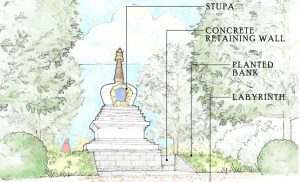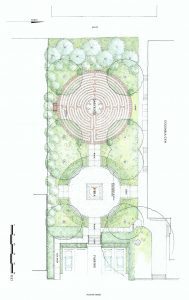A campus lawn on South Fourth Street is being transformed over the next year into a meditation space that will be called the Contemplative Garden at Spalding University, and an initial phase of the project has been completed.
The outdoor space will celebrate peace and compassion and honor the spirit of Louisville theologian and Trappist monk Thomas Merton after the influential meeting he had 50 years ago in India with His Holiness the Dalai Lama.
Construction began this summer on the Contemplative Garden at Spalding University, which will be located at 828 S. Fourth St., next to Spalding’s Columbia Gym and a few blocks south of where Merton had his famed epiphany about the interconnectedness of all mankind.
The Contemplative Garden project was conceived by filmmaker and social entrepreneur Owsley Brown III and Amy K. Peterson, who was one of three founders of Drepung Gomang Center for Engaging Compassion. Brown and Peterson are also leading the community fundraising efforts on the project.
The garden is designed to express the unity experienced by the Dalai Lama and Merton through their historic meeting as well as how both men oriented their life’s activities around the contemplative tradition. The site will include two primary features that express the respective contemplative traditions of the two religious leaders: a 27-foot-tall stupa – a monument modeled in the Eastern tradition – and a labyrinth modeled after the one at the Chartres Cathedral in France. The stupa has been completed with the other elements to be added next.
The stupa contains personal artifacts related to Merton, Mother Teresa and other renowned compassionate individuals from around the world as well as many other symbolic items.
“The impact of the historic meeting between His Holiness the Dalai Lama and Thomas Merton in 1968 has not only played a defining role in the contemporary expression of interfaith dialog but has also served as one of the most powerful examples the modern world has seen in how our common humanity, despite religious and cultural differences, can serve as a deeply unifying force,” Brown said.
The stupa and labyrinth are seen as expressions of Eastern and Western spiritual traditions and function as a symbolic meeting ground in which visitors can participate in quiet reflection and a walking meditation.
“The Contemplative Garden will be a very special place for all people in Louisville to come exhale and reflect in our otherwise hectic urban environment,” Peterson said.
Spalding University, which was founded in 1814 by Mother Catherine Spalding and which serves out its educational mission of peace and justice in the tradition of the Sisters of Charity of Nazareth, became the world’s first certified compassionate university in 2011, as distinguished by the Compassionate Action Network.
In recent years, the Spalding Center of Peace and Spiritual Renewal was developed to help teach students, faculty and staff how to discover common ground with others.
Last spring, Spalding opened the Meditation and Mindfulness Center in the lower level of its library to serve as a dedicated quiet space for students and others to think and reflect.
“Spalding promotes compassion, service, justice and inclusiveness in all of its endeavors while remaining grounded in spiritual values, and the Contemplative Garden at Spalding University will be a beautiful extension of those themes on our campus,” Spalding President Tori Murden McClure said.
The Contemplative Garden will also enhance and beautify an outdoor space in fitting with the university’s greening initiative for campus and the South of Broadway (SoBro) neighborhood. In recent years, Spalding has created Mother Catherine Square in the center of campus east of the Egan Leadership Center and Trager Park in the southeast corner of campus. Spalding also has proposed building an athletic fields complex on more than seven acres of previously unused land between S. Eighth and S. Ninth streets.

